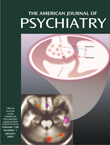A Novel Augmentation Strategy for Treating Resistant Major Depression
Abstract
OBJECTIVE: Treatment-resistant depression is a significant public health concern; drug switching or augmentation often produce limited results. The authors hypothesized that fluoxetine could be augmented with olanzapine to successfully treat resistant depression. METHOD: An 8-week double-blind study was conducted with 28 patients who were diagnosed with recurrent, nonbipolar, treatment-resistant depression without psychotic features. Subjects were randomly assigned to one of three groups: olanzapine plus placebo, fluoxetine plus placebo, or olanzapine plus fluoxetine. RESULTS: Fluoxetine monotherapy produced minimal improvement on various scales that rate severity of depression. The benefits of olanzapine monotherapy were modest. Olanzapine plus fluoxetine produced significantly greater improvement than either monotherapy on one measure and significantly greater improvement than olanzapine monotherapy on the other measures after 1 week. There were no significant differences between treatment groups on extrapyramidal measures nor significant adverse drug interactions. CONCLUSIONS: Olanzapine plus fluoxetine demonstrated superior efficacy for treating resistant depression compared to either agent alone.



